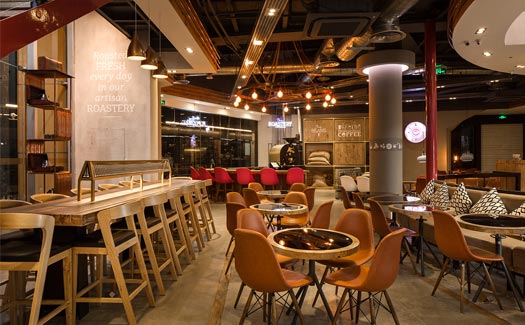The coffee shop project is a unique investment concept that aims to provide a comfortable and integrated experience for customers of all backgrounds. The project offers a variety of hot beverages, such as coffee and tea, as well as cold and soft drinks to satisfy all tastes. It also offers a rich selection of delicious desserts and fresh baked goods, adding value to the customer experience. Additionally, the coffee shop project offers a select menu of snacks to meet the needs of customers looking for a quick and nutritious meal. The coffee shop is distinguished by the high quality of its services while maintaining competitive prices, making it easy to attract a wide customer base. Several important factors contribute to the project’s success, including a strategic location that ensures easy access, attractive décor that creates a comfortable and relaxing environment, and a competent staff focused on providing the best customer experience. The coffee shop project also offers additional services such as free internet, making it an ideal destination for studying, working, and socializing.

A coffee shop project is an attractive investment that combines hot and cold beverages, as well as light desserts and distinctive chocolates, making it the ideal destination for a diverse group of university students, families, entrepreneurs, and others. The project features a modern design that combines comfort and practicality, creating an ideal environment for relaxation or focusing on work and study. The project’s prime location ensures easy access for customers and allows them to enjoy a unique experience in an attractive atmosphere. The project is managed by a professional team to ensure excellent services that meet all customer expectations. Its prices are also competitive, making it suitable for all segments. mashroo3k Consulting Company provides comprehensive services to support investors wishing to implement a coffee shop project, from preparing a thorough economic feasibility study to logistical support and supplying the project with its operational requirements. Therefore, don’t hesitate to request a feasibility study from our experts to ensure the project’s success and long-term profitability.



A prime location with easy access.
High-quality products and services.
Competitive prices.
Highly experienced staff.
Specialized business areas.
Executive summary
Study project services/products
Market Size Analysis
Risk Assessment
Technical study
Financial study
Organizational and administrative study

The service sector represents an important part of the economy, in fact, it represents the largest part of the global economy. The service sector is considered an industry and a science, focusing on the production of services rather than tangible goods, such as cars, aircraft, machinery, and equipment. The service sector is concerned with providing services to people, including banking, communications, wholesale and retail trade, engineering, medical services, tourism, and non-profit economic activities such as customer service and government services that include development, national defense, and maintaining internal and external security.
The commercial sector includes the e-commerce sector and the wholesale and retail trade sector. The commercial sector in the Kingdom has witnessed numerous developments during the years of the Ninth Development Plan. The number of commercial registrations issued by the end of the fourth year (2013) of the Ninth Development Plan increased to exceed 1.37 million registrations, while the number of companies reached more than 86,000. The number of licenses for installment sales, debt collection, and follow-up services reached 115,000. The recently released annual report issued by the Ministry of Commerce for the year 1435 AH revealed that the commercial sector contributed to the gross domestic product.
The relative contribution of commercial activities to GDP increased, with the wholesale and retail trade, restaurants, and hotels sectors contributing 8.8% to GDP, and construction and building 4.4%.

The number of internet users in the Kingdom increased from 19.6 million to 24 million between 2014 and 2016, according to a 2016 report by the Communications and Information Technology Commission. E-commerce is experiencing significant growth due to the availability of convenient payment methods, improved shipping methods, and changes in societal culture in recent years, driven by the availability of social media and the proliferation of smartphones, which have become an effective channel for completing many purchases. Data from the Saudi Payments Network (SPA) revealed that 2015 saw the recording of more than 1.1 billion financial transactions, with a total value exceeding 626.3 billion riyals, with an average monthly transaction volume exceeding 52 billion riyals. This was done through more than 17,000 ATMs and over 225,000 POS terminals spread across the Kingdom. The data added that last year saw steady growth in the number of POS terminals at payment outlets, increasing by 62% compared to the previous year.
The number of internet users worldwide reached 3.2 billion, with 157 million internet users in the Arab world. There are 11 million Facebook users in Saudi Arabia, including 3.2 million expatriates. There are 9 million Twitter users in Saudi Arabia, and 8.8 million Instagram users. Sixty percent of internet users in Saudi Arabia shop online, and 40% of online purchases are focused on mobile phones and accessories. 71% of shoppers in the Kingdom are young people, and 29% are women.